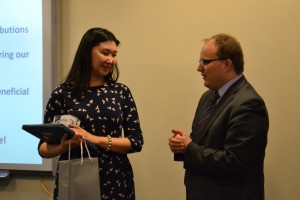Introduction
During November 2015, twenty-five academic colleagues from universities across Kazakhstan undertook a study visit to Newcastle University. The visit was hosted and facilitated by staff from ECLS and managed through the North Leadership Centre. Our visitors had a busy schedule of taught sessions and workshops during which they were offered insights in to a wide range of academic practices. At the same time, the visitors experienced British life – both in Newcastle and further afield. Every day was an opportunity for learning, but what have they learned and what difference will it make in their own work and in development of Higher Education in Kazakhstan? One session was about blogging for academic development and communication. Here in their own words is a blog post written collaboratively in that session. Writing in English they reflected on their experiences and possible outcomes, helping us make sense of how they are “going beyond the information given”.
Professional development
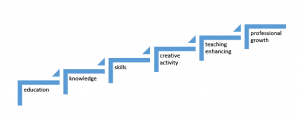
Meiramgul Mukhambetova, Aizhan Mamyrbekova, Gulsara Turguntayeva, Saltanat Nyshanova, Gulsim Tulepova
In education the term professional development can be used in reference to a wide variety of specialized training. To be professionally developed teachers should improve their professional knowledge, skills, competence and creative activity. In practice professional development for educators encompasses an extremely broad range of topics and formats. It would be helpful, for example, to work with colleagues in professional learning communities to develop teaching skills. This might help us to develop collaborative courses that are taught by teams of two or more teachers. We would like opportunities to be professionally developed to increase our teaching skills by using different types of learning technologies. All of the aspects which we learned about in Newcastle, such as constructivism, critical thinking, working in small groups, microteaching and online learning are priorities for our professional development. Our learning will have an impact on our own students’ learning and future success. To succeed we should improve our professional development step by step.
Microteaching
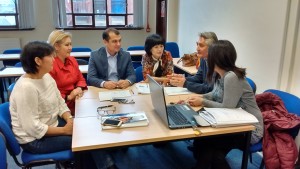
Dana Jantemirova, Bibenur Baidalinova, Galiya Suleimenova, Laura Butabayeva
Today I want to tell you about my microteaching experience at Newcastle University. It was amazing! Many thanks to our tutors: Anna Reid and Alina Schartner
And what is microteaching you ask me?
Microteaching required us to present to our colleagues a short episode of a lesson of our choice.
We discovered that it is an excellent way to understand your teaching techniques not only “inside” but more important “outside”. Microteaching pushed us to leave our comfort zone because our everyday practice means the interaction with our students a lot and we cannot observe ourselves. In this case it is possible to improve our teaching practical skills.
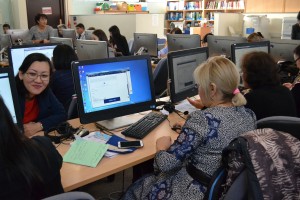
How does it work?
Colleagues gather in one small group and one of them presents the short episode of his lecture or seminar (or something else) and during the lesson colleagues behave as students. The group then all evaluate his style of lesson, his techniques of teaching. In this way we improve our interactive skills.
How can it be used in our future?
We should share the experience for improving the teaching quality of our colleagues.
At the end, we understood that using microteaching experience will be useful for our colleagues to improve their interactive practical skills, interpersonal relationships and making their lessons more effective.
Assessment
Gulshat Abugaliyeva, Laura Oilybayeva, Marianna Dyachuk, Aliya Seraliyeva
Assessment is used to know what the student’s skill level is in the subject. It also helps the teacher decide how to explain the material more efficiently.
There are many aims of assessment:
- selection
- motivation
- improvement the process of education
- feedback
- control
We believe that assessment must be clear and give understanding for all students.
Summative and formative assessment are often referred to in a learning context as assessment of learning and assessment for learning respectively. Assessment of learning is generally summative in nature and intended to measure learning outcomes and report those outcomes to students, parents and administrators. Assessment of learning generally occurs at the conclusion of a class, course, semester or academic year. Assessment for learning is generally formative in nature and is used by teachers to consider approaches to teaching and next steps for individual learners and the class.
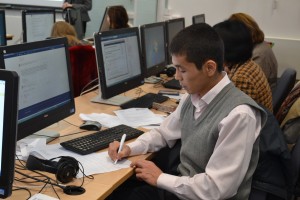
Formative assessment is generally carried out throughout a course or project. In an educational setting, formative assessment might be by a teacher or the learner, providing feedback on a student’s work and would not necessarily be used for grading purposes. The formative assessments aim to see if the students understand the instruction before doing a summative assessment. A common form of formative assessment is diagnostic assessment. Diagnostic assessment measures a student’s current knowledge and skills for the purpose of identifying a suitable program of learning. Self-assessment is a form of diagnostic assessment which involves students assessing themselves.
Summative assessment is generally carried out at the end of a course or project. In an educational setting, summative assessments are typically used to assign students a course grade. The summative assessments are made to summarize what the students have learned, to know if they understand well. This type of assessment is graded and often counts, it can be in form of tests, final exams, projects, etc. Assessments are important because they decide if the student passed or failed the class. If teachers only do summative assessments, the learners will know how well they have done too late. The importance of pre-assessment is to know what the skill levels of a student are before giving further instructions. Giving a lot of feedback and encouraging are other practices.
When we come back to Kazakhstan we will use all of information which we learned in Newcastle University. We are interested an assessment and mainly formative assessment. Before doing any work (task) with students we give them criteria of assessment. Formative assessment will helps us to improve motivation for learning the subject and to use it in future.
Online learning: taking the borders away make learning everlasting

Aidar Aitkulov, Khamit Sarsenbayev, Beibyt Temirbekov, Murajan Aslanov, Zukhra Abdrakhmanova, Tatyana Kim
The session was devoted to online learning which was presented by “Queen of Moodle” in Newcastle University – Eleanor Gordon. The first thing she asked us to do was to name the online tools we work with. The point is that most of the participants are not acquainted with online tools which may be used for both learning and teaching. Then we were given the challenge to find the information about different online tools we are not familiar with. They were chosen by Eleanor and also it was her initiative to form the groups we were going to work in. For example: Onenote, Mind42, Twitter, Wikispace, WordPress, Moodle. We found it interesting that we were allowed to use GOOGLE.
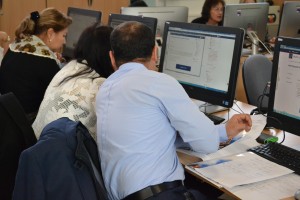
Having discovered the information we were able to share it and discuss in special chats which are still in our online profiles. And also we took part in an online forum. We came to conclusion that different online tools are used for different aims: either you use it for communicating with your peers or students. The discussion occurred about the advantages and disadvantages of online learning.
One part of the participants spoke about the following advantages:
- It may saves time to get to your teacher or students
- It helps to cover the wider number of students, much more than a room may include
- It is more interesting for students to use up-to-date electronic tools
- They may navigate on both computers and mobile devices anywhere and anytime
The second one had these arguments:
- Online learning and teaching takes time
- It is impossible to concentrate on one theme
- If there is no electricity then online learning is over.
- Is harmful for our eyesight
- No communication face to face without seeing the emotions and the language of the body
- Students may cheat
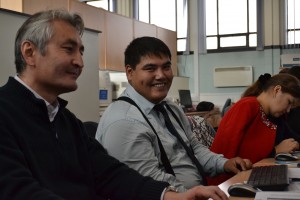
Some items were really controversial. And the discussion was really hot. We discussed how to transfer these tools into our own teaching contexts. We aim to implement at least one online tool in our teaching. And so there are still many things to ponder over. There are the things that may “surprise, confuse and inspire” us. And it is only your choice either use it or not. We hope that this session will be a kind of beginning of taking the borders away to teach and learn.
Peer observation
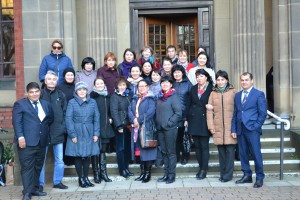
Aktorgyn Agisbayeva, Gulzhanat Baigudanova, Ainura Amirova, Ulbossyn Kanseitova, Aigul Uteshkaliyeva, Gulnar Mukusheva
Peer observation is a process of teaching which mutually enhances the quality of teaching. It is cyclical, reciprocal and iterative process. We will consider this using the following questions such as who, why, what and how. To support peer observation a short workshop should be scheduled before the paired members of staff undertake observation to discuss demands, areas and methods of observation and teaching.
- Who should participate in the observation? We believe that senior and junior staff and also the head of the department should be involved.
- Why use peer observation? It is for own professional development and giving feedback (self-analysis, analysis of observer and some evaluations of the head of the department).
- How should observation be done? It should be taken into consideration post observation discussion for observer and for teacher. Both of them should have the plan: the teacher should have the lesson plan and observer should have observation plan. All of these things under the discussion should have the exact criteria of observation.
- What should be observed? Contemporary methods of teaching any subject and also improvement of students’ knowledge.
- When should observation happen? Peer observation must be done according to the schedule. The scheme operates for all teaching staff (both on full and part time students) other than those on probation for whom arrangements for observing and evaluating teaching process.
We would like to say that using peer observation is necessary and useful for members of the department. We’ve come to the conclusion that there needs to be a mutual understanding and trust between peers.
Conclusion
The themes that the course participants have reflected upon above provide an indication of the areas of professional and pedagogic practice that they feel they have scope to develop in Kazakhstan. We wish the participants well in their ongoing work and look forward to meeting more of their colleagues later this term.
